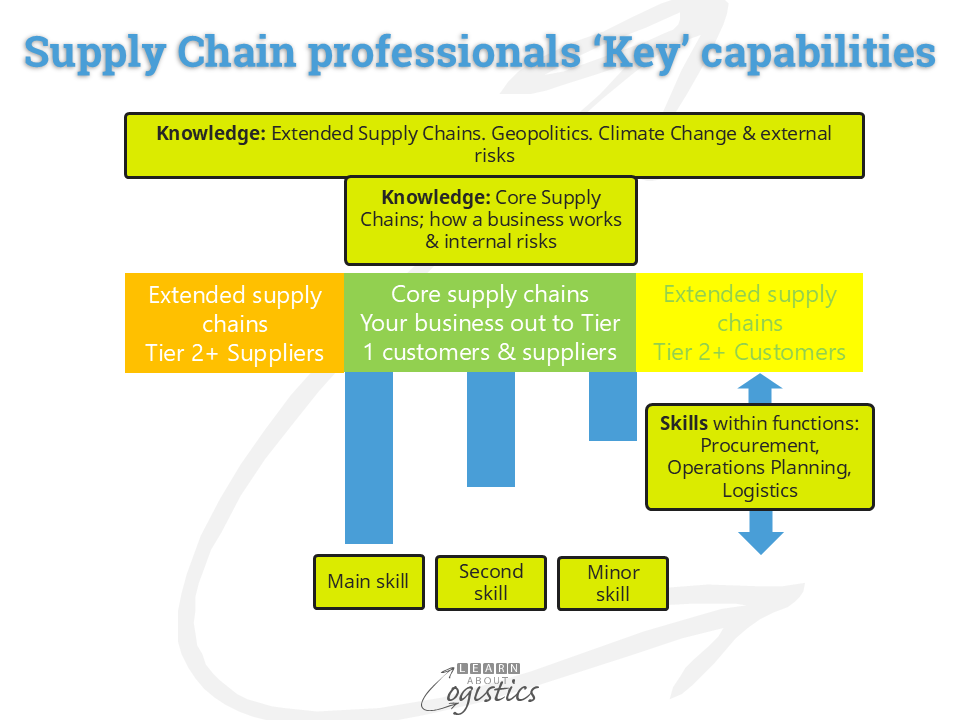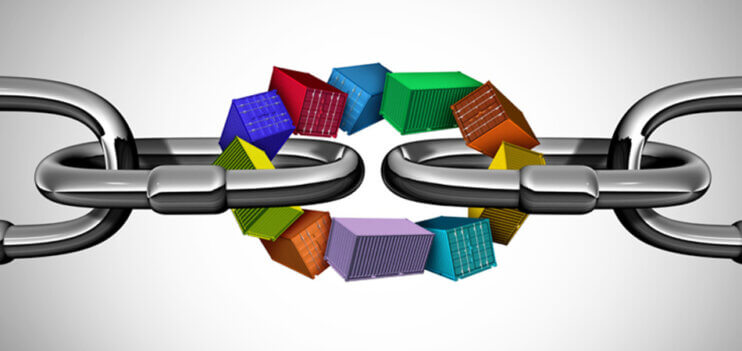Select your skills
As a supply chain professional, it is unlikely that you will possess all the skills required to cover all jobs in the Supply Chains group. However, it is a sign of a good professional to know which skills are required and to help build the team around those requirements, which includes for all to upgrade knowledge and skills.
However, there continues to be a need for rebalancing task priorities. A change from emphasis on the ‘urgent’, addressing efficiencies and cost control, to enhancing the ‘important’ roles of adding value, identifying and managing risk and building sustainable supply chains. In our own lives, is it better to have a performance goal of losing 10kg in weight over a short period, or a longer term goal of understanding ‘what and when to eat to maintain a healthy weight’?
Lists of suggested skill for supply chain professionals can be viewed on-line, although be critical of what you read, as some appear to be written by people with limited experience. Also they do not differentiate between Knowledge – what you are expected to know and Skills – what you can do. An earlier blogpost discussed the ‘key’ diagram as a method to distinguish the two streams.

From the lists, identify the knowledge and skills that are experiencing a shortage in your country or region. This will require some investigation. Articles written by US based writers have identified data science for AI and demand forecasting as skill shortages in that country. But as these areas are more widely discussed concerning improvements in supply chains, is there an assumption of skills shortage by commentators?
From experience in the Asia Pacific region, Learn About Logistics considers the actual shortage is knowledge about supply chains and networks and the skills required for planning and scheduling an enterprise. Examples of tasks that require knowledge but too often are considered as ‘important but not urgent’ are: supply chains network design; segmentation of items, suppliers and customers and SKU rationalisation. Skills that are considered ‘important but not urgent’ are: analysis of supply chain flows; S&OP process facilitation, inventory analysis and the scheduling process for different types of production.
Skills for supply chain professionals
To obtain formal recognition concerning supply chain fundamentals, complete a certification program from a professional membership organisation. Diplomas that are awarded by colleges for the ‘how to’ competencies achieved also have value. Post-graduate qualifications in supply chains expand your knowledge, but the learning should be ‘why this is done’, rather than ‘how this is done’.
Your organisation’s supply chains are part of a network system, which means that decisions made in one part of a single supply chain can affect the total chain, but that will take time to adapt to the new situation. The current uncertainty concerning global trade and the possible effects on supply chains emphasise the need for supply chain professionals to enhance their skills in Critical and Creative thinking.
Trying to obtain a balance between the demands of competing interests is unlikely to provide a single solution or an either/or choice. So, without a ‘correct’ answer, supply chain professional must be capable of handling tensions, reconciling diverse interests and perspectives and therefore trade-offs. This requires the ability to use analysis techniques for complex supply chain problems and to be creative when addressing a problem. So, together with the need for technical expertise will be a requirement for ‘soft’ skills:
- Communicate effectively through different media and styles. Skills in writing, speaking and presentation to sell the changes required in supply chains to senior management and affected functions
- Empathy to build relationships and collaborate effectively with others from diverse backgrounds
- Manage change through problem identification and implementation of changes, that recognises and addresses the potential impacts on stakeholders
Skills for working together
Success for the Supply Chains group within an organisation depends on all functions recognising that ‘working together’ is a challenge. But the Aim of Availability of products and services for customers relies on the extent to which people can work together across functional and organisational boundaries.
Because working across functions and disciplines is required, to what extent should a supply chain professional build their knowledge of other disciplines? Short courses in finance and accounting is a must, to enable discussions with accountants about the ‘error of their ways’! But the challenge with a changing discipline like IT, is that if not continuously applied, knowledge can become outdated, so continuous self-learning should be the rule. Read books and on-line articles, attend relevant workshops and conferences and invite knowledgeable people (such as representatives of technology suppliers) to visit for a coffee and chat?
This is especially true for Procurement professionals, who, to be effective, should not be so knowledgeable about a product, material or industry that they fail to ask ‘dumb’ questions of suppliers. If so, the outcome can be that both parties assume the Procurement professional already knows the answers and important elements of the negotiation are ignored.
Surveys have identified that few companies have a formal perspective on their organization’s strategically important skills and competencies and to identify the skills they need to develop and grow the capabilities of their people. Should staff be employed to achieve current objectives, knowing that, as conditions change, people with different skill sets will be required? Or, should enterprises recruit staff with an emphasis on achieving medium and long term ‘learning goals’, in addition to the necessary short-term performance goals?
However, it is a mistake to initially consider the needs of individuals in the Supply Chains group. Given the Aim of the group is to provide Availability of goods and services for customers, what are the objectives? In support of the objectives, the goals of your organisation’s Supply Chains group and the attributes (knowledge and skills) required of people in the Supply Chains group can then be identified – not forgetting the soft skills!

